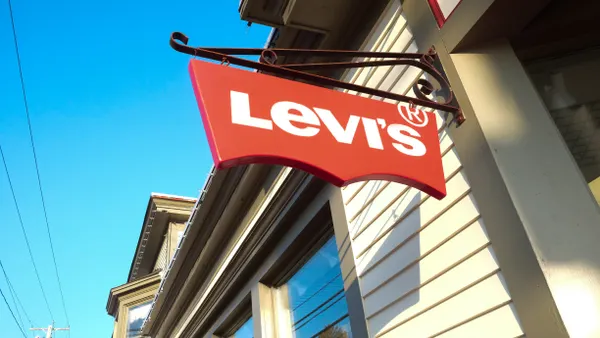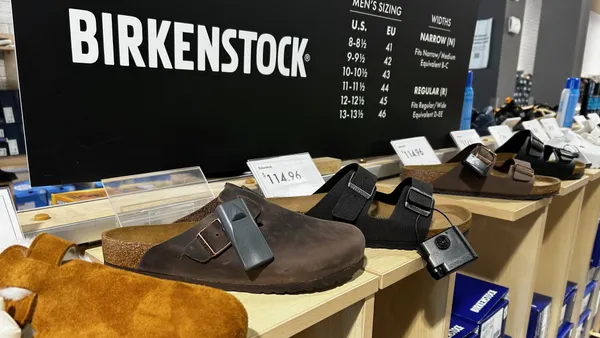Dive Brief:
-
Wall Street rewarded Walmart on Tuesday, sending shares up 4.5% Tuesday on news that it’s focusing even more on its e-commerce operations, which were jumpstarted by its $3.3 billion acquisition of Jet last year. Walmart’s own site will be redesigned, featuring Jet’s "smart-car" algorithm giving shoppers various ways to lower their final checkout price, loading more premium brands and hiring some 2,000 "category specialists" to ensure effective product descriptions at Walmart.com, Walmart U.S. e-commerce chief Marc Lore said Tuesday at the retailer’s investors day in Bentonville, AR.
-
The retail giant forecast net sales growth of 3% next year, along with 40% growth in online sales. Walmart plans 1,000 pickup stations for online grocery orders and will continue to cut prices, to the tune of several billion dollars, executives said. Capital spending will reach some $11 billion, on par with this year, including investments in store remodels, supply chain and e-commerce operations.
-
When it comes to stores, Walmart plans its most scaled back brick-and-mortar growth the U.S. in some 15 years, opening 280 net new stores globally, with a focus on Mexico and China, executives said. In the U.S. that includes plans for 15 Supercenters and fewer than 10 of its smaller Neighborhood Markets stores.
Dive Insight:
Walmart, the biggest retailer in the world that until last year practically left its e-commerce operations to drift, is doing what many analysts love to see in an era when Amazon dominates headlines. Presentations at its investors day in Arkansas revealed a decided pivot from its roots as a brick-and-mortar retailer with rock-bottom prices and super-efficient supply chain. The expectation is for 40% online sales growth for the year.
"We like [Walmart’s] aggressive and innovative strategies to leverage its store network, which we believe provides strategic advantages over both brick and mortar and online competition, to drive store, digital, and omnichannel growth," Cowen & Co. analysts said in a note emailed to Retail Dive. "We're pleased [Walmart] understands the future of retail is the consumer, as customers will not differentiate between shopping channels and will demand all-channel execution."
Cowen analysts said they were impressed with the retailer’s recent mobile app enhancements, including Mobile Express Returns, Mobile Express Pharmacy and Mobile Express Money Service. It wasn’t always this way. Walmart’s e-commerce sales growth simmered gently at some 3% before the arrival of Jet and its founder Lore. Lore has grabbed headlines ever since, with a series of e-commerce acquisitions meant not just to boost online sales, but also reach a new customer.
"Multiple years of investment to play catch-up are paying off as [Walmart] better leverages unique assets on land and in the digital world," Jeffries analysts said in a note emailed to Retail Dive. "The shift from playing defense to offense is well underway and a culture of innovation is alive and well. We believe there is growing investor trust that [Walmart] can prosper despite the competitive landscape and deliver on financial goals with higher certainty as it pulls various levers to manage the business."
Some analysts, however, continue to see these moves as a defensive position — against Amazon — that misses other aspects of today’s retail environment that involve more than e-commerce. "If you want to impress Wall Street you’ve got to show growth," Howard Davidowitz, chairman of New York City-based retail consulting and investment banking firm Davidowitz & Associates, told Retail Dive in an interview. "From a defensive point of view, Walmart is showing desperation. I don’t expect all this to end well."
While 40% in digital sales growth seems impressive, that’s easier to achieve considering Walmart’s previously poor showing, according to Davidowitz.
"The base is 3%, the worst in retail," he told Retail Dive, noting that Walmart had already acquired several tech and e-commerce companies for their Silicon Valley operations even before its Jet purchase and bringing in Lore. "Macy’s is 20%, Nordstrom is 20%. They’re the last. They paid $3.3 billion for Jet, they’re ahead 40%. They’re nowhere. They’ve got a terrible penetration. Look at the companies they bought and look what they spent. Will all this investment work with the Walmart culture? That’s a big problem, and the [jury] is out.”
Walmart has also abandoned its previous strategy of smaller format grocery stores that are bringing dollar stores and chains like Aldi better returns on investment, Davidowitz warned.
"Fifty percent of their business is food and consumables, they’re the largest food retailer in America by far, and there’s one principle that you should never forget: food is a convenience business. Walmart is not convenient, they have an exposure in their supercenters, which will continue to be less relevant," he said. "The small convenient type stores — that is an area that’s critical. What they should have done is be sitting there with tens of thousands of small convenient stores. Walmart lost a tremendous amount of market share to Kroger because they aren’t convenient."
The pivot Walmart is undertaking and that executives outlined further on Tuesday was rewarded by investors, but they won’t necessarily remain patient. Cowen analysts noted several risks, including the emerging price war in grocery sales. Walmart "will need to expertly balance the need to potentially invest more in price than previously anticipated which could limit gross margin upside vs. potential traffic deterioration," they warned. "Further, while we are excited by recent omnichannel initiatives and pipeline of tests, we do think there is risk to overloading associates with information, which could negatively impact customer satisfaction, although Walmart academies should provide associates with tools."
Furthermore, while any retailer, including Walmart, must definitely have a clear e-commerce strategy, it’s not so clear that the retail giant’s focus on competing with Amazon will be a good long-term growth solution.
"The guy running the show amidst all this change is Marc Lore, let’s face it," Davidowitz said. "When the dust settles I think Sam Walton will be turning over in his grave — I knew Sam very well. Just like no one could be Sam Walton, they can’t be Jeff Bezos. He attracts all the right people, he’s one of the greatest entrepreneurs, probably on par with Sam Walton. Walmart doesn't have that kind of leader. They’ve got this Lore running up and down the hall buying everything and he’s a hero — but for how long?"














